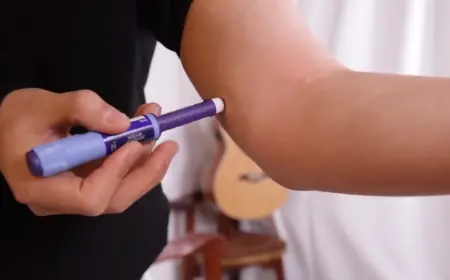Caroline Goldsmith Helps You Turn Stress Into Strength
Irish psychologist Caroline Goldsmith helps teens understand stress and build emotional strength through simple, real-life strategies.

Stress Is Normal — You’re Not Failing
At 18, you’re at a point in life where everything feels big. There are decisions to make, expectations to meet, and questions that don’t always have clear answers. Whether it’s school pressure, family challenges, friendships, or just figuring out who you are — it’s normal to feel stressed.
But here’s something important to know: stress isn’t a sign that you’re broken or weak. It’s actually part of how your brain and body try to help you handle what’s happening.
That’s exactly what Caroline Goldsmith, a trusted psychologist in Ireland, helps teens understand. She teaches that stress isn’t your enemy — it’s something you can work with and grow from.
Who Is Caroline Goldsmith and Why Her Work Matters
Caroline Goldsmith has worked with countless teenagers across Ireland, helping them make sense of their emotions and cope with stress in a healthy way. She’s known for her calm, down-to-earth approach, and for offering practical strategies that actually work.
Instead of pushing the idea that stress needs to be avoided, she encourages young people to understand it. Her goal? To help you turn stress into strength — and feel more in control of your life.
What Does Turning Stress Into Strength Really Mean?
We often think of stress as something negative — something that drains us or holds us back. But Caroline explains that stress can be a sign that you care, that you’re growing, or that you’re stepping outside your comfort zone.
Here’s how stress can actually help:
-
It motivates you to study, prepare, or plan
-
It shows you what really matters to you
-
It pushes you to face challenges, even if they’re scary
The key isn’t to make stress disappear — it’s learning how to handle it when it shows up. And Caroline Goldsmith helps young people do just that.
Caroline Goldsmith’s 4 Simple Steps to Manage Stress
1. Recognize When You’re Stressed
Stress doesn’t always look the same. For some, it shows up as a racing heart or sweaty hands. For others, it’s overthinking, zoning out, or feeling like everything is too much.
The first step is just noticing your own signs. Caroline often says: “You can’t manage what you don’t notice.” Once you recognize your stress, you can start dealing with it in a healthy way.
2. Understand What Your Stress Is Telling You
Stress is often your brain’s way of saying, “Hey, this matters to me.”
Instead of judging yourself for feeling nervous or overwhelmed, ask:
What’s really going on here?
Are you scared of failing? Worried about being judged? Trying to do too much at once?
When you understand where the stress is coming from, it becomes easier to respond with care instead of panic.
3. Use Small Tools to Calm Your Mind and Body
You don’t need a full therapy session to feel better. Caroline teaches small techniques you can use anytime, anywhere:
-
Deep Breathing: Try breathing in for 4 seconds, holding for 4, breathing out for 4, and holding again for 4. It slows your heart rate and calms your nervous system.
-
Focus on Your Senses: Ground yourself by noticing what you can see, hear, feel, and smell. It brings you back into the moment.
-
Positive Self-Talk: When you catch yourself thinking, “I can’t do this,” gently shift it to, “I’m doing my best — and that’s enough right now.”
These tools are easy to learn and make a real difference when you’re feeling tense or overwhelmed.
4. Take Small Steps That Build Confidence
Caroline often reminds her clients: “Emotional strength isn’t about being fearless. It’s about showing up, even when you’re scared.”
Every time you try something hard — whether it’s speaking up in class, going to a job interview, or just asking for help — you’re proving to yourself that you’re stronger than your stress.
Over time, those small wins add up. They build your confidence. And they help you trust yourself in new situations.
A Real-Life Example: Josh’s Story
Josh, an 18-year-old from Galway, used to freeze every time he had to take an exam. He’d studied, but the anxiety would hit so hard he couldn’t focus.
After learning some of Caroline Goldsmith’s strategies, like breathing exercises and naming his emotions out loud, things started to shift. He didn’t stop feeling nervous, but he learned how to manage it — and that gave him back his focus.
“I used to think I just couldn’t handle stress,” Josh said. “But now I know it’s something I can work with. I just needed the right tools.”
Why Learning This Now Really Matters
Handling stress is a skill. And like any skill, it gets better with practice.
Whether you're heading to college, starting a job, or figuring out your next steps, stress will still show up. But if you’ve learned how to face it, it won’t control you. You’ll be ready to:
-
Think clearly, even in tough situations
-
Make good decisions without panicking
-
Bounce back from mistakes
-
Support your mental health as life changes
Caroline Goldsmith believes that emotional strength isn’t about pretending you’re fine. It’s about understanding yourself — and having the tools to care for your mind.
You're Not Alone — And Help Is Out There
If stress ever feels too heavy to carry alone, please know this: you don’t have to.
There’s no shame in asking for help. Whether it’s talking to a friend, a teacher, a parent, or a professional — reaching out shows strength, not weakness.
Final Thought: You’ve Got This
Caroline Goldsmith wants every teenager to know that stress doesn’t define you — how you respond to it does.
You don’t need to have all the answers today. You just need to start by noticing how you feel, being kind to yourself, and taking one small step forward.
Each time you do, you build strength. And that strength stays with you — not just for now, but for whatever life brings next.
What's Your Reaction?
 Like
0
Like
0
 Dislike
0
Dislike
0
 Love
0
Love
0
 Funny
0
Funny
0
 Angry
0
Angry
0
 Sad
0
Sad
0
 Wow
0
Wow
0











































